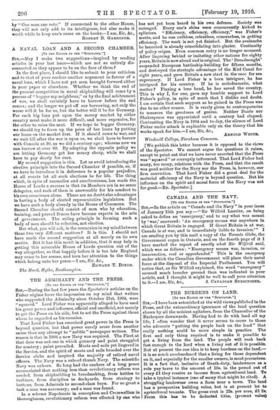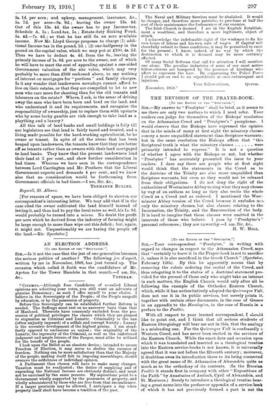THE BURDENS ON LAND.
[To THE EDITOR OP THE " SPECTATOR.1 SIR,—I have been astonished at the wild views published in the Press, and the extraordinary ignorance of the land question shown by all the noisiest agitators, from the Chancellor of the Exchequer downwards. Having had to do with land all my life, I often wonder that it never seems to occur to those who advocate " putting the people back on the land " that really nothing could be more simple in practice. The first and only thing required is to make it possible to get a living from the land. The people will rush back fast enough to the land when a living out of it is possible. But at present the one idea is to keep burdens on the land,— it is so much overburdened that a living for those dependent on it, and especially for the smaller owners, is most precarious. It is a fact that, inclusive of Death-duty, landowners as a rule pay taxes to the amount of 10s. in the pound out of every £1 they receive as income from agricultural land. To take a typical instance (one of many that might be cited). A struggling landowner owns a farm near a town. The land has a prospective building value, but is at present let to agricultural tenants. The gross rent is 22s. per acre, £1 2s. From this has to be dedneted tithe, (present value) 3e. id. per acre ; and upkeep, management, insurance, &c., 5s. 7d. per acre—Ss. 8d.; leaving the owner 13s. 4d. Out of this 13s. 4d. the owner has to pay Income-tax, Schedule A, is.; Land-tax, ls. ; Estate-duty Sinking Fund, 5s. 4d.-7s. 4d.; so that he has still 6s. an acre available income. Now Mr. Lloyd George proposes to charge (1) addi- tional Income-tax in the pound, 2d. ; (2) one-halfpenny in the pound on the capital value, which we may put at £100, 4s. 2d. Thus we have to deduct 4s. 4d. from the 6s., leaving the princely income of ls. 8d. per acre to the owner, out of which he will have to meet the cost of appealing against a one-sided Government valuation of the site value, which may very probably be more than £100 reckoned above, to say nothing of interest on mortgages for " portions " and family charges. Is it any wonder that landowners nowadays cannot afford to live on their estates, or that they are compelled to let to new men who care more for shooting than for the old tenants and labourers on the estate? Where, I ask, is the sense of driving away the men who have been born and bred on the land, and who understand it and its requirements, and recognise the responsibility of ownership, just to replace them with upstarts who by some lucky gamble are rich enough to take land as a plaything and a luxury ?
All this talk of land banks and small holdings is folly till our legislators see that land is fairly taxed and treated, and a living made possible for the hard-working agriculturist, be he owner or tenant. In spite of all the abuse that has been heaped upon landowners, the tenants know that they are better off as tenants rather than as owners with their land mortgaged to land banks. They know that the present landowners lend their land at 2 per cent., and show further consideration in bad times. Whereas we have seen in the correspondence between Lord Carrington and Mr. Prothero that the Liberal Government expects and demands 4 per cent., and we know also that no consideration would be forthcoming from Government officials in bad times.—I am, Sir, &c., Sopwell, St. Albans.
TREMATNE BULLER.
[For reasons of space, we have been obliged to shorten our correspondent's interesting letter. We may add that if in the case cited the owner cultivated the land himself instead of letting it, and thus had to pay the local rates as well, his ls. 8d. would probably be turned into a minus. No doubt the profit per acre which he derived from the industry of farming might be large enough to more than wipe out this deficit ; but, again, it might not. Unquestionably we are taxing the people off the land.—En. Spectator.]









































 Previous page
Previous page